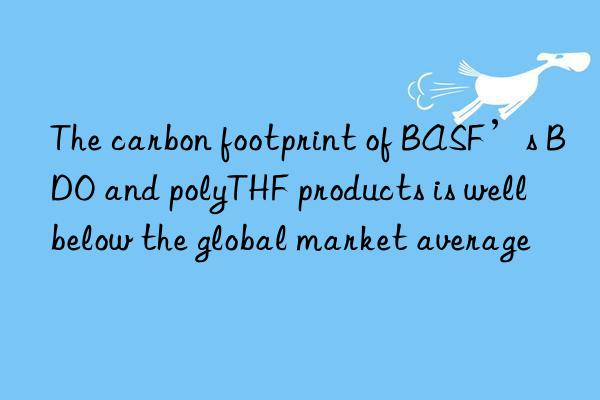
From early 2024, BASF will offer its 1,4-butanediol (BDO) and polytetrahydrofuran (PolyTHF®) as "low PCF" products. BASF calculated the product carbon footprint (PCF) of these two chemicals. The results were compared with market average carbon footprint assessments of corresponding third-party products. The analysis shows that, due to BASF’s production setup, the PCF of BDO and its derivatives (e.g. PolyTHF®) is significantly lower than the global average PCF of corresponding third-party chemicals produced entirely from fossil feedstocks.
On its path to net-zero CO2 emissions by 2050, BASF is the first major chemical company to offer customers individual PCFs for all its sales products. PCF includes the total greenhouse gas emissions that occur before a product leaves a BASF plant and is delivered to a customer: from resource extraction to precursor manufacturing to the manufacture of the final chemical product itself.
Many factors that contribute to a low product carbon footprint
PCF is determined by many factors. For example, energy production at BASF's own gas-fired cogeneration plants produces significantly fewer greenhouse gas emissions compared to other conventional energy production methods. In addition, thanks to BASF's integrated system and continuous efforts towards operational excellence, the production process of low-PCF intermediates has high production efficiency in terms of energy and raw material consumption. Finally, low PCF intermediates typically use oil, natural gas, or integrated by-products rather than coal as the primary raw material. Due to its chemical properties, the use of coal often results in a higher carbon footprint of downstream products compared to natural gas or oil.
Ketan, Head of Intermediates Operations at BASF Joshi said: “Companies’ CO2 reduction targets play an increasingly important role in the value chains we serve. With our low PCF intermediates, we are supporting our customers in achieving their goals: they now have the option to choose consciously Products with a carbon footprint well below the global market average. By providing customers with product-individual CO2 emissions data, we also provide transparency unique to the chemical industry."
BDOandPolyTHF®: important raw materials in many value chains
BDO is mainly used in the production of PolyTHF®. For example, BASF customers use PolyTHF® to produce elastic spandex and elastane fibers, which are used in a variety of textiles such as swimwear, sportswear and underwear, as well as outerwear such as shirts and stretch jeans. Elastane ensures long-term comfort and is moisture and microbial resistant. PolyTHF® can also be used to produce thermoplastic polyurethane (TPU) Chemical raw material used by BASF customers to make highly wear-resistant and elastic hoses, films and cable jackets, mainly for the automotive industry. Other applications include cast elastomers used in making wheels such as skateboards and inline skates. BASF, with five polyTHF production plants in Europe, North America and Asia Pacific, is one of the world's most important suppliers of this versatile intermediate.
BDO is also polybutylene terephthalate (PBT) The raw material, PBT is an engineering plastic that has been successfully used in the automotive, electrical and electronic industries (BASF trade name Ultradur®). BDO is also used in the production of tetrahydrofuran (THF) and N-methylpyrrolidone (NMP), whose primary use is as a key solvent in pharmaceutical manufacturing and cathodes for lithium-ion batteries, such as in electric vehicles.

 微信扫一扫打赏
微信扫一扫打赏

